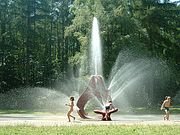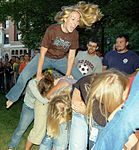Fun: Difference between revisions
m Reverted edits by 75.137.235.198 (talk) to last version by ClueBot NG |
|||
| Line 7: | Line 7: | ||
The word is associated with sports, high merriment,<ref>{{cite book|last=Bailey|first=Nathan|title=An universal etymological English dictionary: comprehending the derivations ...|year=1775|publisher=R. Ware, W. Innys|pages=FU-FU|isbn=978-1234363932}}</ref> and amusement. Although its etymology is uncertain, it may be derived from ''fonne'' (fool) and ''fonnen'' (the one fooling the other).<ref>{{cite book|last=Andreyev|first=Judith|title=Wondering about Words: D'où Viennent Les Mots Anglais ?|year=2005|publisher=Bréal; BREAL|isbn=978-2749503059|pages=26}}</ref> Its meaning in 1727 was "cheat, trick, hoax", a meaning still retained in the phrase "to make fun of".<ref>{{cite book|last=Cousineau|first=Phil|title=The Painted Word: A Treasure Chest of Remarkable Words and Their Origins|year=2012|publisher=Cleis Press|isbn=9781936740253|pages=156}}</ref> |
The word is associated with sports, high merriment,<ref>{{cite book|last=Bailey|first=Nathan|title=An universal etymological English dictionary: comprehending the derivations ...|year=1775|publisher=R. Ware, W. Innys|pages=FU-FU|isbn=978-1234363932}}</ref> and amusement. Although its etymology is uncertain, it may be derived from ''fonne'' (fool) and ''fonnen'' (the one fooling the other).<ref>{{cite book|last=Andreyev|first=Judith|title=Wondering about Words: D'où Viennent Les Mots Anglais ?|year=2005|publisher=Bréal; BREAL|isbn=978-2749503059|pages=26}}</ref> Its meaning in 1727 was "cheat, trick, hoax", a meaning still retained in the phrase "to make fun of".<ref>{{cite book|last=Cousineau|first=Phil|title=The Painted Word: A Treasure Chest of Remarkable Words and Their Origins|year=2012|publisher=Cleis Press|isbn=9781936740253|pages=156}}</ref> |
||
{{Quotation| ''The landlady was going to reply, but was prevented by the peace-making sergeant, sorely to the displeasure of Partridge, who was a great lover of what is called '''fun''', and a great promoter of those harmless quarrels which tend rather to the production of comical than tragical incidents.'' <br>[[Henry Fielding]], ''[[The History of Tom Jones, a Foundling]]'' (1749)<ref>{{cite book|last=Fielding|first=Henry|title=The History of Tom Jones, a Foundling|year= 1749|publisher=Penguin Books (1966)|pages=458 (Book 9, Ch.6)}}</ref> }} |
{{Quotation| ''The landlady was going to reply, but was prevented by the peace-making sergeant, sorely to the displeasure of Partridge, who was a great lover of what is called '''fun''', and a great promoter of those harmless quarrels which tend rather to the production of comical than tragical incidents.'' <br>[[Henry Fielding]], ''[[The History of Tom Jones, a Foundling]]'' (1749)<ref>{{cite book|last=Fielding|first=Henry|title=The History of Tom Jones, a Foundling|year= 1749|publisher=Penguin Books (1966)|pages=458 (Book 9, Ch.6)}}</ref> }} fun is a form of get engy out of ore sistems |
||
The way the word "fun" is used demonstrates its distinctive elusiveness. Expressions such as "Have fun!" and "That was fun!" indicate that fun is pleasant, personal, and to some extent unpredictable. Expressions such as "I was making fun of myself" convey the sense that fun is something that can be amusing and not to be taken seriously. The adjective "funny" has two meanings which often need to be clarified between a speaker and listener. One meaning is "amusing, jocular, droll" and the other meaning is "odd, quirky, peculiar". These differences indicate the evanescent and experiential nature of fun and the difficulty of distinguishing "fun" from "enjoyment".<ref>{{cite web |url=http://www.comp.lancs.ac.uk/~dixa/papers/ECCE-fun-2004/ecce-alan-fun-panel.pdf |author=Alan Dix |title=Fun Systematically |accessdate=November 1, 2010}}</ref> |
The way the word "fun" is used demonstrates its distinctive elusiveness. Expressions such as "Have fun!" and "That was fun!" indicate that fun is pleasant, personal, and to some extent unpredictable. Expressions such as "I was making fun of myself" convey the sense that fun is something that can be amusing and not to be taken seriously. The adjective "funny" has two meanings which often need to be clarified between a speaker and listener. One meaning is "amusing, jocular, droll" and the other meaning is "odd, quirky, peculiar". These differences indicate the evanescent and experiential nature of fun and the difficulty of distinguishing "fun" from "enjoyment".<ref>{{cite web |url=http://www.comp.lancs.ac.uk/~dixa/papers/ECCE-fun-2004/ecce-alan-fun-panel.pdf |author=Alan Dix |title=Fun Systematically |accessdate=November 1, 2010}}</ref> |
||
Revision as of 18:45, 15 May 2017


Fun is the enjoyment of pleasure, particularly in leisure activities. Fun is an experience — short-term, often unexpected, informal, generally not cerebral and generally purposeless. It is an enjoyable distraction, diverting the mind and body from any serious task or contributing an extra dimension to it. Although particularly associated with recreation and play, fun may be encountered during work, social functions, and even seemingly mundane activities of daily living. It may often have little to no logical basis, and opinions on whether or not an activity is fun may differ. A distinction between enjoyment and fun is difficult but possible to articulate, fun being a more spontaneous, playful, or active event. There are psychological and physiological implications to the experience of fun.
Etymology and usage
The word is associated with sports, high merriment,[1] and amusement. Although its etymology is uncertain, it may be derived from fonne (fool) and fonnen (the one fooling the other).[2] Its meaning in 1727 was "cheat, trick, hoax", a meaning still retained in the phrase "to make fun of".[3]
The landlady was going to reply, but was prevented by the peace-making sergeant, sorely to the displeasure of Partridge, who was a great lover of what is called fun, and a great promoter of those harmless quarrels which tend rather to the production of comical than tragical incidents.
Henry Fielding, The History of Tom Jones, a Foundling (1749)[4]
fun is a form of get engy out of ore sistems
The way the word "fun" is used demonstrates its distinctive elusiveness. Expressions such as "Have fun!" and "That was fun!" indicate that fun is pleasant, personal, and to some extent unpredictable. Expressions such as "I was making fun of myself" convey the sense that fun is something that can be amusing and not to be taken seriously. The adjective "funny" has two meanings which often need to be clarified between a speaker and listener. One meaning is "amusing, jocular, droll" and the other meaning is "odd, quirky, peculiar". These differences indicate the evanescent and experiential nature of fun and the difficulty of distinguishing "fun" from "enjoyment".[5]
Fun's evanescence can be seen when an activity regarded as fun becomes goal-oriented. Many physical activities and individual sports are regarded as fun until the participant seeks to win a competition, at which point, much of the fun may disappear as the individual's focus tightens. Surfing is an example. If you are a "mellow soul" (not in a competition or engaging in extreme sport) "once you're riding waves, you're guaranteed to be having ... fun".[6]
The pleasure of fun can be seen by the numerous efforts to harness its positive associations. For example, there are many books on serious subjects, about skills such as music, mathematics and languages, normally quite difficult to master, which have "fun" added to the title.[7][8][9]
Activities
Many physical activities provide opportunities to play and have fun.
Psychology

According to Johan Huizinga, fun is "an absolutely primary category of life, familiar to everybody at a glance right down to the animal level."[10] Psychological studies reveal both the importance of fun and its effect on the perception of time, which is sometimes said to be shortened when one is having fun.[11][12] As the adage states: "Time flies when you're having fun".
It has been suggested that games, toys, and activities perceived as fun are often challenging in some way. When a person is challenged to think consciously, overcome challenge and learn something new, they are more likely to enjoy a new experience and view it as fun. A change from routine activities appears to be at the core of this perception, since people spend much of a typical day engaged in activities that are routine and require limited conscious thinking. Routine information is processed by the brain as a "chunked pattern": "We rarely look at the real world", according to game designer Raph Koster, "we instead recognize something we have chunked, and leave it at that. [...] One might argue that the essence of much of art is in forcing us to see things as they really are rather than as we assume them to be".[13] Since it helps people to relax, fun is sometimes regarded as a "social lubricant", important in adding "to one's pleasure in life" and helping to "act as a buffer against stress".[14]
For children, fun is strongly related to play and they have great capacity to extract the fun from it in a spontaneous and inventive way. Play "involves the capacity to have fun - to be able to return, at least for a little while, to never-never land and enjoy it."[14]
Physiology
Some scientists have identified areas of the brain associated with the perception of novelty, which are stimulated when faced with "unusual or surprising circumstances". Information is initially received in the hippocampus, the site of long-term memory consolidation, where the brain attempts to match the new information with recognizable patterns stored in long-term memory. When it is unable to do this, the brain releases dopamine, a chemical which stimulates the amygdala, the site of emotion, and creates a pleasurable feeling that is associated with the new memory.[15] In other words, fun is created by stimulating the brain with novelty.
In popular culture
In the modern world, fun is sold as a consumer product in the form of games, novelties, television, toys and other amusements. Marxist sociologists such as the Frankfurt School criticise mass-manufactured fun as too calculated and empty to be fully satisfying. Bill Griffith satirises this dysphoria when his cartoon character Zippy the Pinhead asks mechanically, "Are we having fun yet?" In the Beatles song "She's Leaving Home" fun is called "the one thing that money can't buy."[16]
See also
References
- ^ Bailey, Nathan (1775). An universal etymological English dictionary: comprehending the derivations ... R. Ware, W. Innys. pp. FU–FU. ISBN 978-1234363932.
- ^ Andreyev, Judith (2005). Wondering about Words: D'où Viennent Les Mots Anglais ?. Bréal; BREAL. p. 26. ISBN 978-2749503059.
- ^ Cousineau, Phil (2012). The Painted Word: A Treasure Chest of Remarkable Words and Their Origins. Cleis Press. p. 156. ISBN 9781936740253.
- ^ Fielding, Henry (1749). The History of Tom Jones, a Foundling. Penguin Books (1966). pp. 458 (Book 9, Ch.6).
- ^ Alan Dix. "Fun Systematically" (PDF). Retrieved November 1, 2010.
- ^ Alderson, Alf (2008). Surfing: A Beginner's Guide. Chichester, England: John Wiley & Sons. Preface. ISBN 978-0-470-51654-6.
- ^ Matz, Carol (2003). Famous & Fun Classic Themes - 13 Appealing Arrangements for Early Elementary to Elementary Pianists. Alfred Music Publishing.
- ^ de Guzmán, Miguel (2000). The Countingbury Tales: Fun With Mathematics. River Edge, NJ, Covent Garden, London: World Scientific Publishing Company. ISBN 981-02-4032-5.
- ^ Akiyama, Nobuo; Carol Akiyama (1999). Learn Japanese (Nihongo): The Fast and Fun Way. Barron's Educational Series. ISBN 0-7641-0623-6.
- ^ Bruce C. Daniels. Puritans at Play. Leisure and Recreation in Colonial New England. St. Martin's Press, New York, 1995. p. xiii. ISBN 0-312-12500-3.
- ^ Sackett, A.; Meyvis, T.; Nelson, L.; Converse, B.; Sackett, A. (2010). "You're having fun when time flies: the hedonic consequences of subjective time progression". Psychological science : a journal of the American Psychological Society / APS. 21 (1): 111–117. doi:10.1177/0956797609354832. PMID 20424031.
- ^ Glynn, Sarah (August 2012). "Why Time Flies When You're Having Fun". Medical News Today. Retrieved 2013-02-06.
Just being content or satisfied may not make time fly, but being excited or actively pursuing a desired object can.
- ^ Koster, Raph (2010). Theory of Fun for Game Design. O'Reilly Media, Inc. p. 22. ISBN 9781449314972.
- ^ a b Urdang, Esther (2008). Human Behavior in the Social Environment: Interweaving the Inner and Outer Worlds (2nd ed.). Taylor & Francis. p. 445. ISBN 978-0-7890-3417-5.
- ^ Sprenger, Marilee B. (2009). The Leadership Brain For Dummies. John Wiley & Sons. p. 50. ISBN 9780470600054.
- ^ Mark Blythe, Marc Hassnzahl (2004), "The Semantics of Fun", Funology, Springer, pp. 91–100, ISBN 9781402029660
Further reading
- Yates, Vicki (2008). Having Fun. Heinemann-Raintree Library. ISBN 1403498326. Retrieved 4 February 2013.
- Raph Koster (2011), Theory of Fun for Game Design, O'Reilly Media, Inc., ISBN 9781932111972




